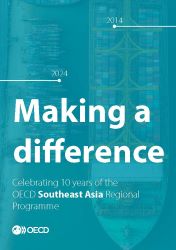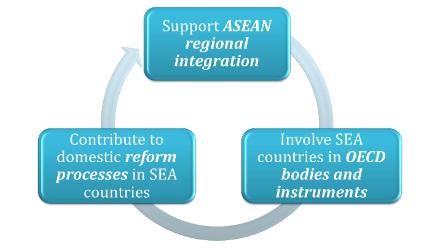The OECD Southeast Asia Regional Programme
Southeast Asia is one of the most dynamic and diverse regions in the world, with a growing influence on the world economy and an ambitious regional integration roadmap. It is increasingly a hub for global economic activity, through integration into key supply chains and as a destination for foreign investment. While the region remains vulnerable to external shocks such as those experienced in the wake of the COVID-19 pandemic, growing domestic consumption and intra-regional trade is contributing to increased economic resilience.
The OECD Southeast Asia Regional Programme (SEARP), inaugurated by OECD Secretary-General Angel Gurría and Japanese Prime Minister Shinzō Abe in 2014, supports the region in its domestic priorities, policy reforms and regional integration efforts. Its structure is designed to encourage a systematic exchange of experience to develop common solutions to regional and global policy challenges. It is comprised of six thematic Regional Policy Networks, the Economic Outlook for Southeast Asia, China and India, and six Initiatives that build on the work of OECD and Southeast Asian bodies and dialogue processes.
>> Learn more about SEARP and its structure
Celebrating ten years of working with Southeast Asia
The OECD Ministerial Council Meeting held on 2-3 May 2024 saw SEARP celebrate its tenth anniversary, with a look back at our achievements since the Programme was established in 2024.
Making a difference: 10 years OECD Southeast Asia Regional Programme
>> Watch the full 10th anniversary celebration at MCM 2024
The programme's objectives and partners
Building on two decades of engagement with Southeast Asia, and acknowledging the region’s strategic importance for the OECD, the Programme aims to provide a whole-of-government approach to countries in the region, fostering the exchange of good practices and mutual learning among policy makers in OECD and Southeast Asian countries.
The ASEAN Economic Community (AEC) Blueprint 2025, launched during the 27th ASEAN Summit in November 2015, specifically identified the OECD as one of the institutions for strategic collaboration in pursuit of a highly integrated, cohesive, competitive, innovative and dynamic Southeast Asia, with enhanced connectivity and integrated into the global economy.
The Programme works in strong partnerships and complementarity with several regional organisations, including the Association of Southeast Asian Nations (ASEAN), the Asia-Pacific Economic Cooperation (APEC), the Asian Development Bank (ADB), the Economic Research Institute for ASEAN and East Asia (ERIA) and the United Nations Economic & Social Commission for Asia & the Pacific (ESCAP).



